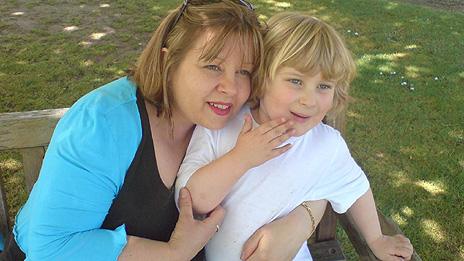Autism: Mother aims for Cardiff business understanding
- Published

Nadine Honeybone with her son Tommy
A disability rights campaigner has set herself the target of making Cardiff the UK's first autism-friendly city.
Nadine Honeybone has set up The Autism Directory Wales to support parents and educate the public.
She claims she has been refused service, and verbally abused by other shoppers, who assumed her six-year-old autistic son was being "just naughty".
Now Ms Honeybone, from Penarth, Vale of Glamorgan, has set up The Autism Directory Wales.
It aims to support parents and educate the public, by demonstrating to business that there is a profit to be made from autistic customers.
And to coincide with Autism Awareness Month in April, she has set herself the target of making Cardiff Britain's first Autism-friendly city.
"You can't tell by looking at a child that they have autism, yet that doesn't stop people presuming that my son is just naughty; tutting at him and sneering at me for being a bad parent."
"A woman in British Home Stores told me to control my child and think of the poor cleaners when I was trying to feed him in the cafeteria."
"Good for her if her children have perfect table manners, but my Tommy doesn't get it; and I don't think that he or I ought to be judged as a result."
"Many parents of autistic children can't cope with being victimised everywhere they go, and simply stay at home and become more and more isolated and depressed."
"While they're at home, they're not spending money!"
"But very often, what people presume to be bad behaviour is in fact a very frightened and confused autistic child, experiencing sensory overload, or venting his frustrations at the mass of contradictions which the rest of us accept as everyday life."
Ms Honeybone said: "When you put on trousers in the morning, you might notice the sensation against your skin for the first five seconds, then your brain accepts it as a constant and chooses to ignore the sensation."
"Autistic people can't do that. Everything they sense is constantly present in their conscious mind, and it's impossible for them to overlook it."
"The same goes for noises and lights and smells; all the things which are present in crowds of shoppers."
"That's why autistic children will often want to strip off, and it's compounded by the fact that they can't grasp social constructs like decency."
"They don't know that people are looking at them and judging them, but the parents do; and it's this which causes so much upset, anger and frustration."
The Autism Directory's 'Cardiff Autism Challenge' invites businesses and service-providers to take-up the groups free autism awareness training.
They will learn about how to spot someone with an ASD condition, how to interact with them, and how to organise their staff and premises to make them as sympathetic to the condition as possible.
In return businesses will be provided with an 'Autism Friendly' poster to display in their window, and Ms Honeybone will promote them as companies who welcome autistic customers, via the Autism Directory's website.
Ms Honeybone is keen to press home the message that being autism-friendly makes business as well as moral sense.
In Cardiff and the Vale of Glamorgan alone, she estimate that the trade from the 7,000 autistic people and their families could be worth as much as £210m a year.
'Not properly understood'
"I knew nothing about autism before I had Tommy, so I don't expect anyone else to either; all I want them to do is have an open mind and let me show them how to make more money."
"I came from a business consultancy background, so I know that every penny counts, and tiny changes can make a big difference."
"Simple things like allowing Tommy to play his favourite DVD while he has his hair cut transform a potential nightmare into a manageable situation."
"Having quiet areas to wait, reducing echo-ey acoustics and avoiding unnecessary changes in lay-out can all help as well."
Suzi Browne, spokesperson for The National Autistic Society, said autism was a serious, lifelong disability, which can make understanding and communicating with other people particularly difficult.
"A lack of understanding from the general public is one of the biggest problems which people with autism and their families face," she said.
"People can be quick to judge a child having a tantrum in the supermarket as being 'a naughty child' or 'in need of a good slap'; and people can ignore adults in the street who they think are acting 'strange' or 'weird'".
"All too often autism is not properly understood and the needs of people affected by autism are not recognised.
"This can lead people with autism to become isolated from their local community, choosing not to go out for fear of the reactions they might face.
"It is vital that we help raise awareness of autism to ensure that people affected by the condition are provided with the appropriate support and understanding in order to help them overcome the social barriers that often prevent them from accessing everyday services that most people take for granted."
- Published4 April 2011